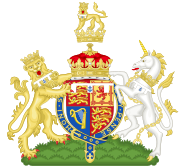This article needs additional citations for verification. (December 2013) |
| Dukedom of York | |
|---|---|
 | |
| Creation date | 23 June 1986 |
| Creation | Eighth |
| Created by | Queen Elizabeth II |
| Peerage | Peerage of the United Kingdom |
| First holder | Edmund of Langley |
| Present holder | Prince Andrew |
| Remainder to | the 1st Duke's heirs male of the body lawfully begotten |
| Subsidiary titles | |
| Status | Extant |
| Seat(s) | Royal Lodge |
Duke of York is a title of nobility in the Peerage of the United Kingdom. Since the 15th century, it has, when granted, usually been given to the second son of English (later British) monarchs. The equivalent title in the Scottish peerage was Duke of Albany. However, King George II and King George III granted the titles Duke of York and Albany.
Initially granted in the 14th century in the Peerage of England, the title Duke of York has been created eight times. The title Duke of York and Albany has been created three times. These occurred during the 18th century, following the 1707 unification of the Kingdom of England and Kingdom of Scotland into a single, united realm. The double naming was done so that a territorial designation from each of the previously separate realms could be included.
The current Duke of York is Prince Andrew, the younger brother of King Charles III. The present Duke's marriage produced two daughters, and he has remained unmarried since his 1996 divorce. As long as Prince Andrew has no legitimate male heirs, the title Duke of York will again revert to the Crown upon his death.